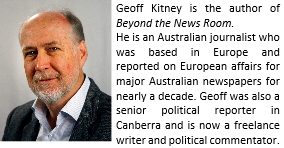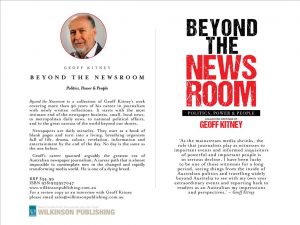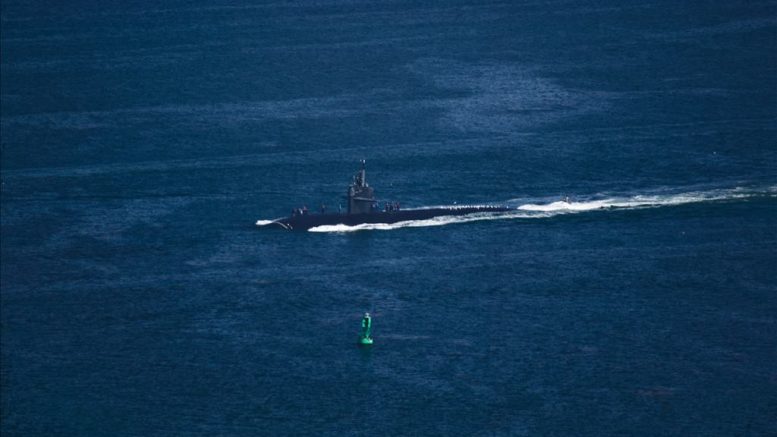The new alliance is troubling political, military and strategic analysts who are concerned that it was put together at lightning speed with little consultation and in secret, writes Geoff Kitney from Canberra.
When it was first revealed that the European Union planned to impose a carbon tax on goods imported from countries which failed to meet their obligations to reduce emissions, there was talk in Australia of “declaring war” on Europe to resist what was seen as a gross act of protectionism.
And now a war of a kind has broken out.
The news a few days ago that Australia has unceremoniously dumped its contract with France to build its new submarine fleet and to join a new “Anglosphere” strategic alliance with the United States and the United Kingdom, has sparked a very nasty war of words. France has taken the unprecedented step of recalling its ambassadors to Canberra and Washington, plunging a vital relationship between Western allies into crisis. France warned of deep damage to trust between NATO partners.
But as France declared its intention to seek billions of euros of compensation from Australia for the scuppered submarine deal and analysts struggled to try to understand the logic and the implications of the creation of AUKUS, none of the new partners was apologetic.
Defenders of the new alliance argued that, while it was unfortunate that France felt snubbed, the bigger picture needed to be kept in focus – that this new alliance was a vital step in the response of Western powers to the rise of China, especially in the Asia-Pacific region.
The Australian Prime Minister, Scott Morrison, insisted that the French should have been well aware that the submarine deal was at risk as Australia had already warned that it was concerned about delays and cost blow-outs in the project.
In fact, Morrison had told French President Emmanuel Macron in a meeting in Paris just three months ago that Australia was pleased with French efforts – in which Macron had a personal role – to get the project back on track.
Critics also puzzled over why the new deal Australia had signed with the US would mean Australia’s new submarine fleet would be smaller and delivered much later than was proposed with the French deal.
But the shock of the Australian decision to summarily cancel the project was only one of the big questions raised by the creation of AUKUS.
Among many aspects of this new Asia-Pacific strategic arrangement between three English-speaking nations which puzzled analysts was why France – with major military assets committed to the Indo-Pacific as part of historic Western alliance cooperation in the region – was excluded, but the UK was invited to participate?
Britain long ago lost interest in the Asian-Pacific region and, quite rightly, focused on its place in Europe and on the trans-Atlantic alliance.
While the concept of a strategic alliance between Anglosphere countries has been discussed since the UK decided to quit the EU and declared its intention to restore itself to a major global power, the logic of such a relationship from the British point of view has always been questionable.
Another question raised about the deal was why Australia would have wanted to create a major break in relations with France when its A$50bn (US$36bn) submarine deal could have been a chip to play in any future confrontation between the EU and Australia over climate change policy.
“(Scott) Morrison’s self-defeating stupidity is remarkable,” wrote one Australian commentator. “What was the only leverage we had against France if it wanted to drive the EU to slap carbon tariffs on us and isolate us on climate? The subs deal. What did Morrison tear up in exchange for this deal with the announcement of this alliance? The subs deal.”
Trade experts also questioned why Australia would unceremoniously insult France just as it was in the final stages of negotiating a Free Trade Agreement with the European Union. Clément Beaune, France’s European Affairs secretary, said Paris had lost trust in Australia and continuing EU trade talks with the country were now “unthinkable”.
More broadly, the announcement of the new alliance troubled political, military and strategic analysts who are concerned that it was put together at lightning speed with very little consultation and in secret.
Some reports suggest it was only proposed by Australia to US President Joe Biden at the G7 meeting in the UK (at which Scott Morrison was attending as an observer) in mid-June.
Bruno Tertrais, a senior strategic analyst at Institut Montaigne in Paris described the shock announcement by Morrison, Biden and the UK Prime Minister, Boris Johnson, as “a diplomatic earthquake”.
There would be a price to pay for this, he said. “How, henceforth, can France take seriously the will of the Biden administration to obtain greater involvement of Europeans in the Indo-Pacific and to have more consultations and coordination between allies vis-à-vis China?”
Carl Bildt, co-chair of the European Council on Foreign relations, described the handling of the submarine deal as “stunningly inept”. He said the offence given to Paris “runs very deep for reasons well beyond the sub deal itself”.
Critics also puzzled over why the new deal Australia had signed with the US would mean Australia’s new submarine fleet would be smaller and delivered much later than was proposed with the French deal. The first of the nuclear-powered US subs won’t be delivered until 2040, provided the project keeps to its promised timetable which such projects almost never do.
While none of the leaders who signed up to AUKUS was prepared to say so, the true logic of this deal appears to be as a means of supporting the United States in its efforts to counter the growing military power and influence of China in the Asia-Pacific region.
Former UK Prime Minister Theresa May focussed on this as the real intent of the new alliance when she questioned why the UK would want to sign up to something which could see it drawn into a major confrontation on the other side of the world – possibly even a war – between China and the US.
By its willingness to snub and insult France by both killing the submarine contract and going further than any other Western country to back the US in trying to block China’s growing role and influence in world affairs – Australia has contributed to helping fracture the European-US relationship.
Analysts have pointed out that Britain appears to have stepped in after European countries balked at attempts by the Biden administration to coerce them into supporting the US’s aim of maintaining its supremacy over China.
And Australia appears to have been persuaded that if it wants to retain the guarantee of US military support in the event that it faces a military threat from another power – most likely China but also potentially its nearest neighbour, the country with the world’s largest Muslim population, Indonesia – it must be prepared to share the burden of US efforts in the Asia-Pacific to counter China’s influence. It must also risk being the trigger for an arms race in the Indo-Pacific region, which already the Malaysian government has warned is likely to be the regional consequence of AUKUS.
While Australia has long insisted that it was possible to balance its vital trade relationship with China and its strategic alliance with the US, the decision to join AUKUS appears to confirm that Australia has decided to choose the US over China.
Fear of the rise of China is at the core of this new alliance.
While the submarine deal will benefit the US, its real interest in AUKUS appears to be in making Australia a major base for US forces and infrastructure. This would be important in the event that it attempts to suppress China and maintain its own global ascendency if it leads to military conflict with China.
Professor Hugh White, defence analyst at the Australian National University and a former senior government strategic adviser, says of the deal: “Whether we like it or not, Australia is going to have to live with China’s power and growing influence. That doesn’t mean doing whatever China says but it does mean stepping back from Washington’s policy of trying to push back China by threatening war.
“But this deal deepens our commitment to the United States’ military confrontation [with] China, which has little chance of success and carries terrifying risks.”
At the same time – by its willingness to snub and insult France by both killing the submarine contract and going further than any other Western country to back the US in trying to block China’s growing role and influence in world affairs – Australia has contributed to helping fracture the European-US relationship.
And, given that China is by far Australia’s most important trading partner and the European Union the second most important, these seem to be very dangerous and potentially catastrophic choices to make.
Among many aspects of this new Asia-Pacific strategic arrangement between three English-speaking nations which puzzled analysts was why France – with major military assets committed to the Indo-Pacific as part of historic Western alliance cooperation in the region – was excluded, but the UK was invited to participate?
Cavan Hogue, a former long-serving senior Australian diplomat, said of the AUKUS alliance: “The message is clear. We (Australia) are not part of the Asian region but are tied to a couple of fading countries that speak the same language and share many of the same prejudices. Most countries in our region do not want to take sides in a contest that is not theirs but Australia has taken sides with the losers”.
A war of words with old allies is one thing. A real war with China – now emerging as a real and growing danger – would be another thing altogether.
President Biden and President Macron are expected to speak by telephone in the coming days.
Headline image credit: RCPPHOTO/Shutterstock.com






